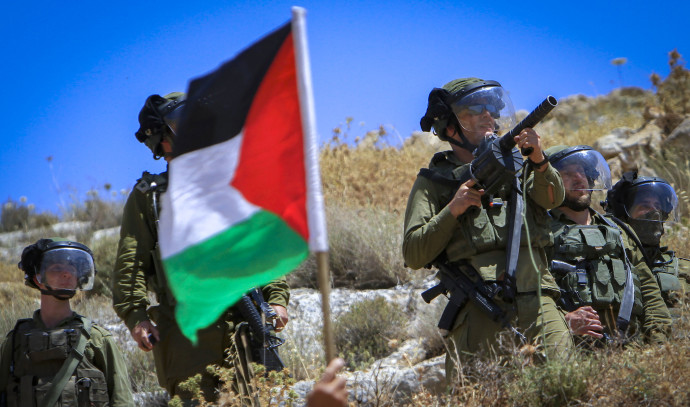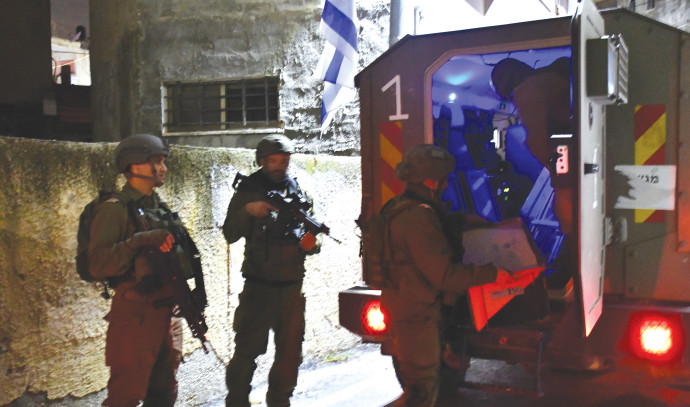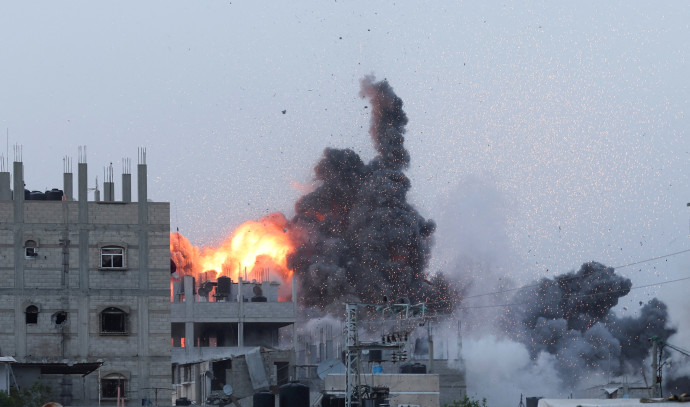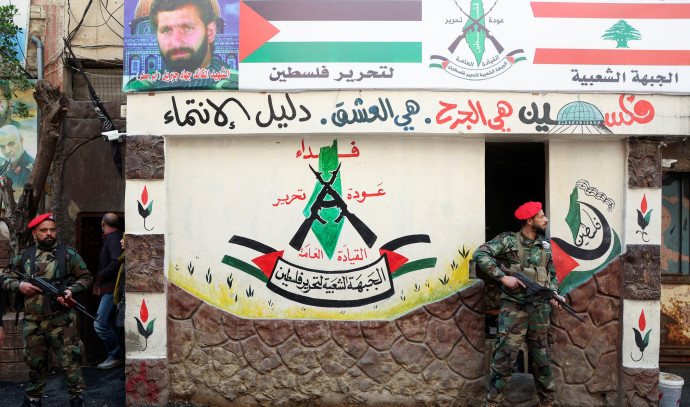world news
Everything you need to know about the Israeli-Palestinian conflict

The Israeli-Palestinian conflict is one of the most well-known conflicts around the world.
Since its beginning shortly after the birth of the State of Israel, the conflict has dominated regional geopolitics for over 70 years. And as the ongoing Israel-Hamas War shows, the conflict’s importance and intensity show no sign of slowing down.
But what is the Israeli-Palestinian conflict? Where did it start? Who are the key players involved?
Here is everything you need to know.Where is Israel?
Israel is a country in the Middle East, specifically in the Levant region. It is steeped in thousands of years of history and has been the home of numerous civilizations and religious faiths.
Israel is bordered by Egypt, Jordan, Lebanon, Syria, and the Palestinian territories and is on the coast of both the Mediterranean Sea and the Red Sea.
While most countries consider its capital to be Tel Aviv, Israel and a few other countries, such as the United States, recognize Jerusalem as the capital.
Where is Palestine?
Palestine is a self-proclaimed country, recognized largely as the Palestinian territories, located in the Middle East, specifically on the west bank of the Jordan River (known colloquially as the West Bank) and in a region along the Mediterranean coast known as the Gaza Strip. It is bordered by Israel, Jordan, and Egypt, with the Gaza Strip being on the coast of the Mediterranean Sea.
Though it proclaims Jerusalem as its capital, its de facto capital is Ramallah in the West Bank.
Where is Gaza?
Gaza, known as the Gaza Strip, is a part of the Palestinian territories and is located along the Mediterranean coast. It borders Israel and Egypt and has three border crossings: the Erez and Kerem Shalom crossings with Israel and the Rafah crossing with Egypt.
Has Israel recognized Palestine?
Israel has refused to recognize a Palestinian state, though progress had been made following the Oslo Accords.
Currently, Israel officially supports the idea of a two-state solution. Still, it is at odds with the proposed Palestinian borders, as well as the issue of Israeli settlements in the West Bank and the possibility of Palestinian terrorist attacks against Israel.
However, Israel does recognize Palestinian control over certain parts of the West Bank.
Does Palestine recognize Israel?
Palestine technically does recognize Israel, with then-Palestinian leader Yasser Arafat announcing it as such in 1988. This was reaffirmed following the signing of the Oslo Accords. However, the Palestinian leadership continues to have strong opposition to the State of Israel, and many Palestinian factions disagree with the recognition of Israel.
Israel is oftentimes referred to by these bodies as the “Zionist occupation.”
What is the Palestinian Authority?
The Palestinian Authority is the official ruling entity in the Palestinian territories. It is led by President Mahmoud Abbas and is controlled by his Fatah party.
The PA is based in Ramallah and exercises control over the Palestinian-run areas of the West Bank, as well as claiming control over the Gaza Strip.
The government was meant to be an interim body rather than a permanent political entity.
Officially a democracy, the Palestinian Authority is, in practice, an authoritarian entity, not having had elections since 2006, with further attempts at having elections never actually manifesting.
Abbas was elected to a four-year term in 2005, though his term in office has continued for almost two decades at the time of writing.
The PA has also been accused of violating human rights, censoring a free press, and engaging in widespread corruption.
Currently, the PA is fractured following the 2006 Palestinian parliamentary elections, which saw the terrorist group and party Hamas win control of the parliament. Since then, a schism has erupted between Fatah and Hamas, and attempts at mending this split have been unsuccessful.
What is Hamas?
Hamas is a Palestinian Islamist terrorist group that was founded in 1987 by Ahmed Yassin. Its origins lie in a Muslim charity organization, Mujama al-Islamiya, affiliated with the Muslim Brotherhood organization.
Since its official founding in 1987, Hamas has become infamous for its terrorist activities and its staunch refusal to recognize Israel’s right to exist.
Hamas won the 2006 Palestinian parliamentary elections, but the Palestinian Authority dissolved the government and replaced it with a Fatah-led one, leading to the schism mentioned above.
Hamas has fought several armed conflicts with Israel since taking over Gaza, with the current ongoing war being sparked by Hamas’s attack on southern Israel on October 7, 2023, which saw 1,200 people in Israel killed and 250 people taken hostage.
Hamas’s leadership is spread out between Gaza and Qatar. Its leader in Gaza is Yahya Sinwar, while the organization’s overall political leader is Ismail Haniyeh.
When did the Israeli-Palestinian conflict begin?
The starting point of the Israeli-Palestinian conflict is the subject of fierce debate since many believe the Palestinian national identity didn’t begin until the middle of the 20th century. In contrast, others believe the Israeli national identity did not technically exist until the establishment of the State of Israel.
What is agreed upon, though, is that Jews and Arabs have conflicted with one another in the region since the late 19th and early 20th centuries.
This coincided with the arrival of Jewish Zionist settlers into the future State of Israel to escape antisemitic persecution in Europe. At the time, the land was ruled over by the Ottoman Empire, though by the end of World War I, the British took it over and instituted the British Mandate of Palestine.
Over the coming decades, the two demographics would grow increasingly in conflict as tensions grew, with the Arabs staging multiple revolts in the mandate. In 1947, a plan was proposed by the British to partition Israel into Jewish and Arab states. The Jews agreed, but the Arabs did not.
A year later, Israel declared independence, and war was declared. Surrounded on all sides by enemy nations, Israel proved victorious, and many Arabs ended up fleeing their homes – an event Palestinians refer to today as the Nakba.
Tensions exploded in the late 1980s as Palestinians launched the First Intifada, an uprising aimed at lashing out at what they perceived as an oppressive Israeli occupation. The intifada ended with the signing of the Oslo Accords, which many hoped would lead to a lasting peace. However, fierce opposition by hardliners among both Israelis and Palestinians prevented this, particularly with the assassination of Israeli prime minister Yitzhak Rabin and the election of a new right-wing Israeli government.
In 2000, the Second Intifada started up, lasting several years and seeing multiple casualties. It ultimately ended following the unilateral Israeli withdrawal from the Gaza Strip, though it continues to have control over Gaza’s borders and airspace.
While the most visible part of the conflict now takes place in Gaza, there is still considerable tension among Israelis and Palestinians in the West Bank and east Jerusalem, where terrorist attacks and bouts of violence still occur.
Are Israel and Palestine fighting over Gaza?
The ongoing Israel-Hamas War is fought largely in the Gaza Strip, but it is not a fight “over” Gaza. Only a small minority of Israeli lawmakers are calling for the full annexation of Gaza. Rather, the ongoing war is over the eradication of Hamas and the freeing of the hostages held in Gaza.
world news
IDF forces demolish home of terrorist who murdered 14-year-old West Bank shepherd

IDF forces began demolishing the house of Ahmed Duabsha, a terrorist from the village of Duma, according to Ynet reported on Tuesday night.
Duabsha had been responsible for the murder of Binyamin Achimair, a 14-year-old shepherd, in April.
The terrorist was arrested on April 12 by The IDF, Shin Bet, and Israel Police during an overnight operation.
Duabsha admitted during interrogation to assaulting the teenager, which resulted in his death.About Binyamin Achimair
Achimair had been missing for 24 hours before his body was discovered on April 13.
Achimair had left Gal farm in the Samaria region of the West Bank on the morning of April 12 to allow his sheep to graze, and after several hours, the herd returned without him.
After news of Achimair’s body being found, a few violent incidents – including setting cars on fire – happened in the village Duma, and one person was killed by settler gunfire according to Palestinian reports, Walla reported at the time.
YUVAL BARNEA contributed to this report.
world news
IDF strikes West Bank terror cell as they plant explosive devices

Aircrafts carried out a targeted strike on Tuesday night on the Nur Shams camp, in the West Bank, eliminating a terror cell as they placed explosives, Israeli media reported. The IDF surrounded the squad and attacked it from the air while it was placing the devices.
Maariv, citing Palestinian reports, claimed that 5 people were killed in the strike. The report indicated that only one of the 5 killed were terrorists and that several others were wounded. The Palestinian Health Ministry placed the number of casualties at 4, according to Reuters.
The attack took place near an incident in Jenin in which 22-year-old Captain Alon Sacgiu was killed after his vehicle hit one of the explosive devices.
Uptick in attacks in the area over the last 3 days
This is the third attack in the last three days and, since the outbreak of the war, more than 50 attacks have been carried out in the area.
The Palestinian Health Ministry claimed that Israeli fire, following a military vehicle hitting an explosive device, resulted in the death of a woman and a child.
The ministry did not comment on the age of the child or whether those reportedly killed or wounded were engaged in attacks on the Israeli personnel operating in the area.
Sergeant-Major (Res.) Yehuda Geto, 22, was killed after hitting explosives.
The incident occurred during an operation to counter terrorism in the camp. According to the details of the initial investigation, a bomb exploded under a military vehicle where Geto, who served as a driver in the unit, and a commander were inside.
The IDF said that the military vehicle was in an area where there was no risk of explosives, therefore no searches were conducted for them, Israeli media reported.
world news
PFLP terrorist handbook to be taught at Brooklyn community center

A Popular Front for the Liberation of Palestine (PFLP) book will be taught at a Brooklyn community center on Friday, according to the Samidoun Palestinian Prisoner Solidarity Network Telegram channel.
Samidoun will host a series of group study events on the PFLP document “Strategy for the Liberation of Palestine.”
The document outlines the organization, philosophies, and strategies of the PFLP, and describes its war objective as being “to destroy the state of Israel as a military, political, and economic establishment.”
‘Armed struggle is the only way’
PFLP insists in the book that its aims cannot be achieved “except through armed struggle and a protracted popular liberation war.”
The event will be held at the Mayday Space community center in Bushwick.
Samidoun is listed by Israel as a subsidiary of the PFLP. The PFLP is designated by the US State Department as a foreign terrorist organization.
-

 Solar Energy3 years ago
Solar Energy3 years agoDLR testing the use of molten salt in a solar power plant in Portugal
-

 Camera3 years ago
Camera3 years agoCharles ‘Chuck’ Geschke, co-founder of Adobe and inventor of the PDF, dies at 81
-

 Camera3 years ago
Camera3 years ago80,000MP panoramas: EarthCam announces world’s highest-resolution robotic webcam
-

 Solar Energy7 months ago
Solar Energy7 months agoGlencore eyes options on battery recycling project
-
world news3 months ago
Jewish diaspora expresses concern as Iranian drones launch toward Israel
-

 TOP SCEINCE3 months ago
TOP SCEINCE3 months agoStellar winds of three sun-like stars detected for the first time
-

 Camera8 months ago
Camera8 months agoDJI Air 3 vs. Mini 4 Pro: which compact drone is best?
-
world news8 months ago
Gulf, France aid Gaza, Russia evacuates citizens

